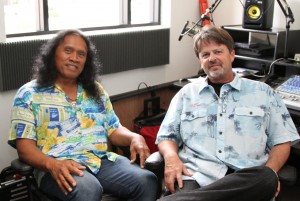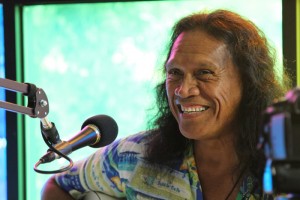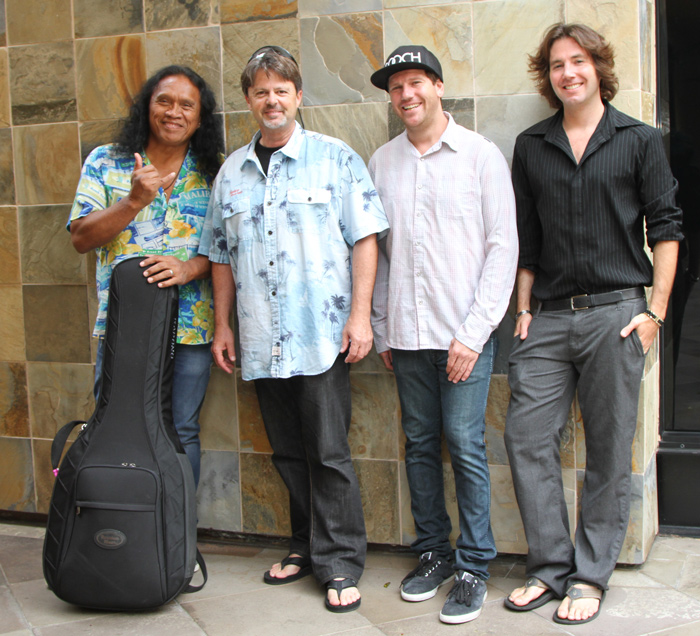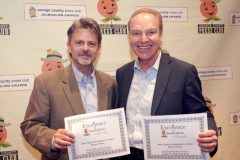By Shelley Murphy
 Henry Kapono arrives at “The Friendship Show” on KX 93.5 F.M. in Laguna Beach, Calif. under tropical, Hawaiian-like showers carrying his signature peace sign guitar and embodying a relaxed Island demeanor.
Henry Kapono arrives at “The Friendship Show” on KX 93.5 F.M. in Laguna Beach, Calif. under tropical, Hawaiian-like showers carrying his signature peace sign guitar and embodying a relaxed Island demeanor.
Kapono stops by on a sleepy Saturday morning before embarking on his “Share The Aloha” tour, which will take him up and down the California coast. It’s a familiar stretch of coastline for him; in the 1980s he wrote “Highway in the Sun” during a springtime trip up Highway 101 from Los Angeles to San Francisco, and he reprises the song live on the radio show.
The Grammy nominated Kapono also treats listeners to a classic rendition of C&K’s “Sailin’” from the duo’s 1977 Night Music album, which also features a remarkable remake of Boz Skagg’s “We’re All Alone.” Kapono says today he continues to add his distinctive sound to covers from Boz Skaggs to Stevie Wonder. “These guys were my teachers.”
Kapono’s appearance on “The Friendship Show” transports listeners back to carefree summer days and rockin’ good times.
Hearing these tunes from the ‘70s and ’80s leads show co-host Scott Hays and Kapono to reminisce about the gigs C&K performed at the The Golden Bear in Huntington Beach—a legendary landmark venue that in its heyday hosted so many great old folkies, rockers and blues artists—from Janis Joplin to Jackson Browne, from Jerry Garcia to BB King, from Jimi Hendrix to Peter Gabriel.

Hays recalls crowds arriving to see C&K smiling, and hours later leaving still smiling.
At a young age Kapono’s father taught him to play the ukulele. At about age 11, he attended a camp where a friend showed him how to play a guitar cord, and he says, “I was hooked.” To this day Kapono doesn’t read music, but plays by ear.
The self-taught musician met Cecilio Rodriguez while jamming with friends on the North Shore. The two quickly discovered their distinctive sound, leading them to say, “Let’s start something.” What Cecilio & Kapono started was a phenomenon that launched generations of fans. Within the year, C&K became the first Hawaiian duo signed by Columbia Records, and as a result, Kapono says, “Columbia Records couldn’t figure out how to market us.”
By the 1970s, however, the collaboration clicked and C&K were the biggest rock duo to come out of Hawaiian Islands, crossing cultures with their blend of contemporary pop and folk rock.
C&K’s produced eight albums before the duo parted ways. In 1981, Kapono embarked on a successful solo career with his first release “Stand in the Light.” His lyrics and songs remain rooted in his Hawaiian heritage, but include influences of Bob Marley, James Taylor, Jimi Hendrix, and Sting.
Growing up in Hawaii, Kapono always felt strong ties to his rich Hawaiian heritage and says “The Wild Hawaiian” remains his most Hawaiian-themed CD, and he hopes it reaches future generations.
Performed in his native Hawaiian language, “The Wild Hawaiian” received a Grammy nomination for best Hawaiian music album in 2007.
The CD features nine tracks, including Kapono’s personal homage to his Hawaiian culture and Island home, along with popular Hawaiian classics such as “Na Ali’I,” which opens the album.
In 2013, the Pro Bowl held in Honolulu featured a “Wild Hawaiian” theme and ceremoniously honored returning military troops. Kapono performed “Na Ali’i” during the halftime show and also played “Coming Home,” a song he was inspired to write by a young friend of his returning from Iraq.
War veterans are close to Kapono’s heart. Early in his career he spent two years performing for military troops in Asia, and that experience had a profound influence on him both personally and professionally. “I matured really fast as a civilian in a war zone—playing for the troops changed my life and career,” he says.
Born and raised in Kapahulu, a small town located just outside Waikiki, the gifted musician remains one of the most popular performers in Hawaii.
Kapono has shared the stage with Santana, Loggins & Messina, Peter Frampton, and Michael McDonald of the Doobie Brothers. He met McDonald performing at a concert on the Big Island, and the two went on to play together for the Dali Lama.
After approximately four decades of performing, Kapono’s 17 solo albums still resonate with people from all walks of life. He explains his loyal fans by suggesting his music transports them to a simpler life, when there were no responsibilities, only good times.”
Kapono’s soft-spoken manner and warm smile reflect the artist of today. “Life has been good to me,” he says.




